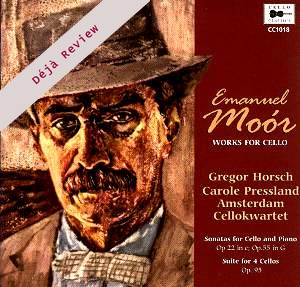Déjà Review: this review was first published in July 2007 and the recording is still available.

Emanuel Moór (1863-1931)
Cello Sonata in G major Op.55 (1901)
Cello Sonata in C minor Op.22 (1889)
Suite for four cellos Op.95 (c.1909)
Gregor Horsch (cello), Carole Presland (piano), Cellokwartet Amsterdam
rec. 2003/2007, Bachzaal, Amsterdam, The Netherlands
Cello Classics CC1018 [68]
Casals had particular enthusiasm for the music of his now less remembered contemporaries; Röntgen and Tovey stood high and both have recently been accorded a measure of disc appreciation. But Moór was another and Casals’s words to the astonished composer – “You are a Genius” – attest both to the Catalan’s overwhelming artistic approval and the volcanic nature of his emotional and musical attachments. If he thought you were a genius, then you were a genius.
If posterity has not accorded Moór that same position in the compositional hierarchy then neither has it with Röntgen or Tovey. Nevertheless there is no vapidity in these two sonatas. The Op.55 sonata of 1901 is vaguely Brahmsian in inclination – lyrical, and played here with a biting woody tone and on-the-string passion by the outstandingly convincing Gregor Horsch. He’s a thoroughly idiomatic-sounding and yet idiosyncratic performer; one doesn’t often hear his kind of playing. In the Magyar-sounding Scherzo he deals vibrantly with the cello’s drone passages and sardonic exchanges. He’s not at all shy of the greasy dig into the string, nor of cultivating the bass-heavy and lowering register. Carole Presland, too, mines richly from the cajoling piano responses; together their veiled search and expressive underpinning of the slow movement is valuable work. So is the their playing of the finale which is avuncular without becoming trivial and lit with a songlike freedom.
Back in 1889 we find the Op.22 Sonata, dedicated to one of that era’s greatest cellists, Alfredo Piatti, a much more freely rhapsodic work. There’s some lovely cantilena here, which must have sounded tailor-made for the Italian cellist, and some demanding writing for the pianist. These two players bring out the richness and bigness of it with magnificent panache. The slow movement is intense and vibrant, once more Brahmsian in cast but not at all in procedure or structure. And the finale is led by commanding and dramatic piano writing which manages – almost – to balance the strenuous cello passagework. This isn’t a sonata on a par with Op.55 but it’s a strong and accomplished work and it’s difficult to imagine much more persuasive advocacy than this.
The Suite for Four Cellos was written around 1909. At its premiere the four players were Casals, Joseph Salmon, André Hekking and Diran Alexanian – not a bad line-up. The writing here is more reminiscent in places of Schubert amidst the expected Late Romantic influences. It’s well laid out and the high point is unquestionably the central movement. This is an unusually grave and intoning stretch of time with a sublimated Rabbinic-Cantorial aesthetic powerfully in evidence. Moór was a Jew, born near Budapest, and his father – originally a tenor – later accepted an appointment as a cantor in New York. Though there are light Magyar influences in the sonatas the Adagio’s gravity seems to derive from an altogether more personal and intense place.
This is an exceptionally fine disc. The notes are extensive and well worth a read on their own; I resolved to follow their lead and try to track down Max Pirani’s 1959 monograph on Moór. His cello works are necessarily reflective of strong influences and it would be wrong to pretend that they are masterpieces. But with performances this ardent we can wallow in the moment and relish the intensity of the music making.
Jonathan Woolf
Buying this recording via a link below generates revenue for MWI, which helps the site remain free.



















